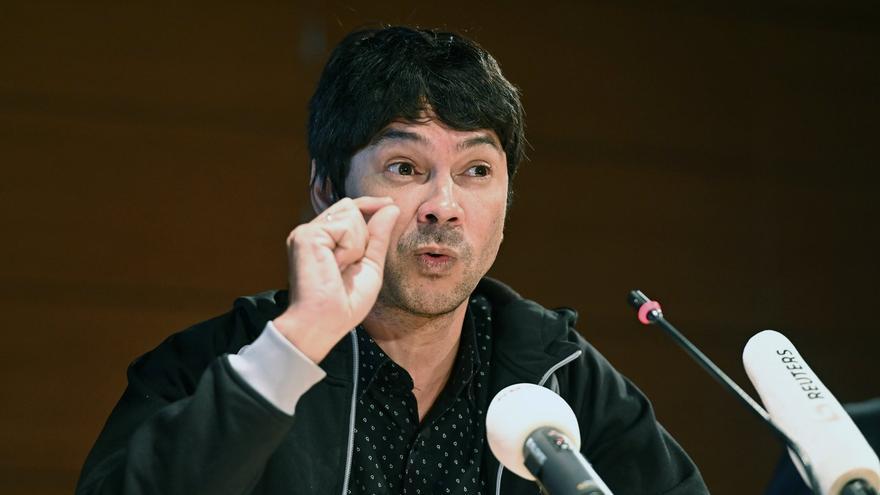
![]() EFE/14ymedio, Madrid, 26 November 2021 — The playwright Yunior García Aguilera, one of the promoters of the Civic March for Change in Cuba on November 15, finally frustrated by the regime, insisted this Friday in Madrid that the Island Government is “a dictatorship of bureaucrats.” They are neither “revolutionary” nor “have anything to do with the people.”
EFE/14ymedio, Madrid, 26 November 2021 — The playwright Yunior García Aguilera, one of the promoters of the Civic March for Change in Cuba on November 15, finally frustrated by the regime, insisted this Friday in Madrid that the Island Government is “a dictatorship of bureaucrats.” They are neither “revolutionary” nor “have anything to do with the people.”
The artist arrived in the Spanish capital by surprise on November 17 because, as he explained, both he and his wife were in danger in Cuba, after promoting a peaceful protest against the Cuban government, and right now he has “a short duration visa with limited territorial validity.”
In a conversation at the Ateneo de Madrid with Valentina Martínez, secretary of International Relations of the Spanish People’s Party (conservative), García said that his arrival in Spain last week was “miraculous” since his “destination was jail.”
The dissident denounced “interrogations and permanent surveillance” by the Cuban government in the days prior to his departure from the country and criticized the current situation on the island, where, he pointed out, the authorities use “panic” to control citizens. García Aguilera, a member of the dissident platform Archipiélago, said that “the regime is in panic and very closed” and that the arrival of social networks represented “a window of hope” to organize in the country.
“Supposedly the United States sends a stream of money for the opposition, we were just guys with cell phones and social networks, that was our job and our crime,” he said.
The playwright noted that the Archipiélago movement “is not from the right, nor from the left, nor from the center.” And he added, “we have in common what hurts us about Cuba, through civic actions, not violence.” Along these lines, he commented that his activism went to another level after the arrest of the artists of the San Isidro Movement in November of last year.
“I grew up being a revolutionary child in a revolutionary family, I wanted to change things from there, from the allowed channels, but from that moment on I understood that it was very difficult to change things through those channels,” he said.
For this reason, he looked for other references of Cuban culture and after that he “disconnected” from the story he had always heard and understood that his criticism had to be “more frontal with the regime.”
The playwright explained his departure from Cuba and acknowledged that “even today” there are things that he does not know how they could have happened.” That day the car we were in broke down, we had to take a taxi, we thought it was all a trap, that the person who was helping us was an accomplice [of the regime]. Even at the airport we thought they were going to catch us there and they were going to say that we were fleeing and they were going to put us in jail,” he recalled when speaking about the trip, which was accomplished with the help of the Spanish Government.
The Cuban government, he said, has been creating “a very subtle system so that the repression is not seen” for 62 years, and where they generate “mistrust” so that friends, relatives and acquaintances are “suspected and you always believe that they can betray you… They make it so that you can’t trust anyone,” he added.
____________
COLLABORATE WITH OUR WORK: The 14ymedio team is committed to practicing serious journalism that reflects Cuba’s reality in all its depth. Thank you for joining us on this long journey. We invite you to continue supporting us by becoming a member of 14ymedio now. Together we can continue transforming journalism in Cuba.
